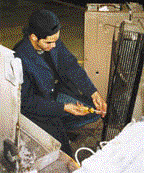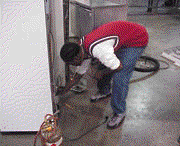

Lofty as they are, these goals are not impossible. In fact, Harry Basey, hvac instructor at Madison Park Technical Vocational High School in Boston, MA, has shown that it can be done. Not only are his students benefiting from his program, so are many low-income residents around Boston.
Basey, with the help of Thomas Younis, career manager for Boston City Schools, created the Recycle for Reuse Program.
The program acquires used appliances to be repaired by hvacr students and then donated to needy families. The process allows students to learn basic hvacr with a hands-on approach and to appreciate what they are doing because their work benefits people who need it.

Recycle and Reuse
Before taking his current teaching job, Basey worked for a number of years in the hvacr industry, including 10 years in service maintenance. During this time, Basey had the opportunity to travel to many different vendors and was able to see how many appliances were discarded. “I was amazed to see how much stuff got thrown away,” he said.Basey then took this opportunity to make a little extra money. He found that he could take some of these unwanted appliances, fix them up, and sell them.
When Basey changed jobs and started teaching at Madison Park, he decided to bring this idea into the classroom. With the help of Younis, Basey was able to start the Recycle for Reuse Program.
The program is a unique collaboration between Madison Park, a few appliance distributors, and the Boston Housing Authority (BHA). Through this network, the hvac department hopes to improve the academic skills of students, create a top-notch training program, and also help with economic empowerment in the community.
Basey has received appliance donations from Sears, Whirlpool, and several other local distributors, but the biggest contributor has been Amana.
“Amana has been unbelievable,” said Younis.
In fact, Basey makes a weekly trip to each of the companies; on average, the program receives 20 different appliances per week.
When the appliances are brought to the school, they are graded by age and condition. For example, each donated refrigerator is tested by a student to see if it operates properly. Basic components such as compressors, condensers, evaporators, and metering devices are checked out.
If the appliance can be repaired, a student writes a service report on the work that needs to be done.
According to Basey, this is a valuable step because many students and service technicians currently in the industry have trouble with it.
Basey emphasized the importance of teaching students the proper way to fill out work orders, and their instruction includes how to fill out the paperwork. It’s not enough to just do the job properly; students must complete the service order stating exactly what was done and the tools used.
After the service report is completed, the parts are replaced. Defrost timers are routinely replaced on all frostfree models, and door gaskets are checked for tears and to make sure they seal properly.
Next the refrigerator is cleaned and sanitized. Then a final test is run to determine temperature readings. After this final test, the unit is tagged and ready to be delivered.
The BHA then takes care of dispersing these fixed appliances to the people who need them. The only time the program will ask for money in exchange for a repaired appliance is when an organization requests one. But Younis says that priority goes to donating the units to needy families, who receive appliances at no charge.
Also, Younis says that the life cycle of a typical refrigerator is 15 to 20 years. The pieces that the program receives are typically between five and 10 years old, ensuring on average that the people receiving them should have a running appliance for another five or 10 years.
Of course, not all the appliances Basey receives are adequate. The appliances that cannot be repaired are stripped for parts and recycled. The program also had the good fortune to receive a dumpster to store the stripped down parts. These parts are then recycled for money, which goes back into the program.
All unusable refrigerators are stripped and taken care of following EPA guidelines.

Numerous Benefits
Although the Recycle For Reuse Program is a unique way to recruit more technicians, Basey says it is not the program’s only reason for existing. “The end goal is not to create hvac techs alone, although it’s a worthy goal because of the shortage. I’ve seen it’s good for a lot of kids with learning disabilities. They need hands-on activity, and it gives them self-esteem.”Younis agrees. “The kids get to see everything, and it is easier for kids to visualize. It’s easier for kids to see a washer and dryer and take it apart and get to identify with it,” he said.
The self-confidence comes when the students see that the work they are doing is benefiting the area community. But Basey says that the program is also benefiting the students, and not just because they are receiving a hands-on education. Students also have the opportunity to make money. For each service report that a student completes on an appliance, the student receives a stipend. When the appliance has been paid for, the money that does not go back into funding the program goes to the student.
Basey says that about half of his students have an after school job, and of that half, a majority are working because they need to help their families. “In the inner city, a lot of kids work out of necessity,” he said. “They work because they have to work.”
This program gives the students an opportunity to make extra cash just like Basey did early in his hvac career.
So far, the program seems to be a success. In fact, Basey has seen some of the results firsthand.
He related a story about one of his students, who brought a room air conditioner to school that he had found someone throwing away. The student fixed up the air conditioner in class and sold it for $75 the same day.
“It’s not unique,” Basey said about the incident. “It’s happened more than once. I’d rather have him deal air conditioners and refrigerators than drugs.”
The other benefit of the program is that it is self-sufficient, according to Basey. Money for the sold units and the recycled units goes back into the program to pay for replacement parts. Basey’s program does not have to rely on any funding to continue thriving.
Younis hopes that the program may soon be able to help even more of the Boston community. The program is entertaining the notion of starting a training center that would be open to other people in the community besides Madison Park students.
“We are hoping to run evening classes to get people citywide,” Younis said.
These people would include employees of the BHA or anyone else who may want to learn the trade.
“What we are looking to do is get adults in the program,” Basey said. “We would like to help people who are out of high school or maybe dropped out. We’re talking to the city about training their people.”


Report Abusive Comment